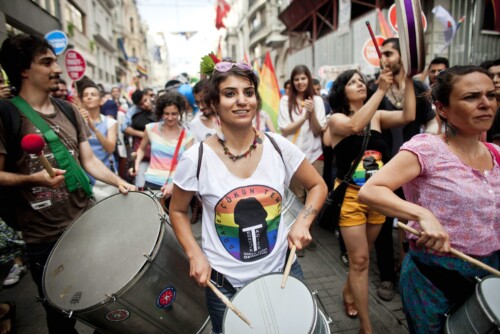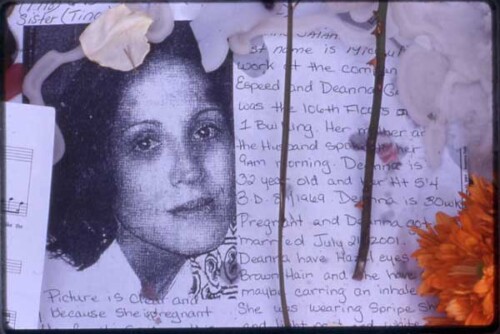A note about this piece. 1
Queer Politics in A Time of Rising Right Wing Populism
BRENNA MUNRO: Thank you so much for talking to us again Graeme. Following up on the previous interview that we did, since then, obviously, Trump has become president, so I wanted to ask you, how you see that changing the political landscape, both internationally and domestically.
GRAEME REID: During the last 8 years, the US has really positioned itself as being in the forefront of LGBT rights internationally and they’ve done that in various ways. Broadly speaking, the US has provided material support and political cover for organizations around the world and this has had quite an influence in terms of international activism. We see organizations that are willing to be more visible and more vocal; and clearly, there are number of factors that contribute to that, but one of those has been the very strong stance that the U.S. government has taken ever since Hillary Clinton’s gay rights are human rights and human rights are gay rights speech in Geneva, followed by Obama’s memorandum around sexual orientation and gender identity, LGBTQ issues have been integrated within U.S. foreign policy. We’ve seen that in Obama’s ability and willingness to speak out on LGBT issues, sometimes in difficult situations and in difficult contexts such as in Kenya or in Senegal, for instance; and so that’s set a certain tone of the US, and certainly their active participation in the core group of LGBT-friendly States within the UN, and the willingness of the US government to expend political capital in significant issues within the UN, such as the recent appointment of independent expert, Professor Vitit Muntarbhorn. So you know, that role is likely to change significantly under the new government. It’s still unclear as to how things are going to play themselves out. There is an indication, for instance, that the US will continue to play a role within the core group. At the same time, at the recent CSW [Commission on the Status of Women] gathering, there were organizations that are very much anti-LGBT that were included within the US delegation. On the other hand, Nikki Haley has spoken out about the situation in Chechnya, so we’re getting mixed signals and mixed messages in terms of the international role that the US would play. I would anticipate that it would likely be less proactive in terms of the political voice and that certainly, it seems that there’ll be less funding available for LGBT groups. Also of concern is the passage of the Global gag rule and the kinds of implications that that will also have for LGBT groups, many of whom operate under a health umbrella; and then of course, domestically, it remains to be seen what effect this is going to have in terms of LGBT rights here. Now, clearly what happens in the Supreme Court and the kinds of judgments that come out of the Supreme Court are going to be critically important because the Supreme Court has made very critical, very important, very vital judgments that have assisted in equality for LGBT people here. And then secondly, you know, there’s an expectation around the increase in religious exemption legislation; now it appears to me that Trump is not overtly concerned around this particular issue, around LGBT rights. Of course, the vice-president is. Pence is clearly very much invested in, certainly, religious exemption legislation as his own record shows, and it remains to be seen as to what kind of concessions that the Trump administration makes to social conservatives because clearly, they need to offer something, and it’s been interesting that twice, there’s been an anticipation of an executive order around religious exemptions in both instances that hasn’t materialized as yet. I think what’s of concern is what happens at a state level and we see for example, the laws at a state level that allow for adoption agencies, for instance, to discriminate. So you know, whether it’s in Alabama, whether it’s in South Dakota, and I think that’s something we really need to watch as to what is going to be happening at the state level. And I think it goes without saying that the new administration has put wind in the sails of the social conservatives and those who are pushing for religious exemption legislation or similar. We don’t know yet what’s going to happen with the First Amendment Defense Act and if that’s going to come back. Trump has said in the past that he would support that. Again, it remains to be seen. So I think we’re in that sort of waiting period of it not being clear yet what the U.S. role is going to be, either internationally or what the implications of the election are going to be in the long term domestically.
Current Global Developments, Chechnya
BRENNA MUNRO: So, can you shed some light on what’s happening in Chechnya? Why do you think this is happening now and what are the most helpful transnational responses?
GRAEME REID: So, I think that, you know, Kadyrov, the Chechen leader, had in mind that this would be a win-win situation for him in terms of consolidating his support within Chechnya and also, that there’s a sort of tacit approval from the Kremlin in terms of their anti-LGBT stance that has manifested itself within the propaganda laws. But it’s backfired because there’s been an enormous international outcry, it’s put Putin in a difficult situation because of the international pressure that’s brought to bear and the negative international attention which he doesn’t like. And I think we’re starting to see results whereby Putin has spoken out about it, he’s been put into a position where he needs to do so, and this has been through sustained international attention, both at a country level and from activists and advocates around the world, who have drawn attention to this. There’s a politics of denial that’s going on that claims that this is not happening, and so the work of documenting the voices of victims, of piecing together what has happened even though it’s very difficult to do so, because these detentions of course, are all informal and aren’t part of any legal process. People are held in informal detention centers, there’s no record of their arrests, and so people are terrified, understandably terrified because of the experiences that they’ve had. So it’s difficult to get the first-hand information, but not impossible; and so part of it’s about gathering that information and making people aware of exactly what’s happened, and then the immediate-term of ensuring the safety and security of those people who have managed to escape, and then, ultimately, to take steps in order to make sure that the perpetrators are brought to justice, and that’s going to be the most difficult aspect of it, because Kadyrov has acted as if he can do this with impunity and it would be important to show that he can’t get away with it. But that’s going to be a long uphill battle to ensure that justice is ultimately done.
BRENNA MUNRO: And what about the piece of it, in terms of the movement out of Chechnya of vulnerable men and their families?
GRAEME REID: One of the most challenging aspects of the crisis that has been sparked by the rounding up and torture of gay men in Chechnya is that, once released, these individuals are not safe either in Chechnya or, in fact, in Russia, because the tentacles of the security forces and family networks are such that they remain vulnerable wherever they are in Russia. So, it’s very important that people are able to leave; they are in temporary shelter, those who have managed to escape at the moment, but it’s a short-term and temporary solution, and the wheels of relocation move very slowly. And, so, this creates a real problem in that, you know, countries really need to find a way to expedite resettlement, and an added complication is that many gay men are married to women and have families, they live closeted lives and they’ve been exposed through this process of detention, and so some have fled with their families to the city, others have fled alone and their families are still in Chechnya, and those families are vulnerable. And so it also means that those countries who are offering asylum to people at risk need to consider their families as well, so it’s not the typical case of a gay refugee who’s kind of fleeing across the border and the kinds of categories that are often imposed on refugees in terms of assessing their claims. You know, often, they have to go through a process of kind of proving that they’re gay and there’s certain kinds of stereotypes of what it means to be gay that are applied; and in this instance, we have some heterosexually-married men with families who need to relocate as a family, even though the man is gay. So, it’s going to also require some imaginative thinking in terms of the immigration authorities, as they think about the category of what it means to be gay in different social settings.
BRENNA MUNRO: Are there any other developments elsewhere in the world that are getting less attention right now that you’d like to highlight?
GRAEME REID: You know, there’s areas of concern for us, one is in Indonesia, for instance. We’ve seen an increase in rhetoric from government officials, and that’s always worrying, because its anti-LGBT rhetoric, and that gives tacit permission for discrimination and violence, that’s what we find in our experience. And, you know, we’ve seen the fact that extremist groups work in collaboration with police in terms of trying to entrap people, we see arrests in the Ache province where two young men face the possibility of being whipped for their relationship; and you know that’s always a disturbing trend when instead of government standing up and asserting the equal rights of everyone, [it] joins in the chorus of anti-LGBT rhetoric, because it has very dangerous consequences. So that’s a particular area of concern. Also in Tanzania, there’s another situation unfolding there where there’s a clampdown basically on health organizations that provide services for men who have sex with men. It’s somewhat unprecedented because as you know in settings where it’s difficult to be LGBT that the health services provide one area in which people find some kind of safety and ability to organize and to at least protect health interests, and yet within Tanzania there is this enormous clampdown on these organizations and groups. So those are two kind of areas of concern just to mention two specific countries, but on the other hand, last year we saw the appointment of the independent expert on sexual orientation and gender identity after a long and protracted battle and an unprecedented battle in fact around the appointment of an independent expert, never in the history of the UN have we seen such a sustained challenge to an appointment of an independent expert in any arena but in each stage of the appointment process it was challenged by various states who fundamentally object to his appointment, and that objection is based on the assumption that sexual orientation and gender identity has no business within the work of the United Nation, so it’s a really fundamental challenge, and it’s also of extraordinary importance that this has in fact gone through and this appointment has been made. Now partly it’s in terms of the practical work that he’s going to do, the reports that he’ll produce and the first one will be delivered in June of this year at the Human Rights Council session, and then there will be country reports that will follow that, but that’s somewhat limited, there will be two reports a year, country specific reports, but there’s also the dimension, the symbolic value of his presence within the UN, because ultimately it’s about making LGBT rights, making the attention to human rights abuses on the basis of sexual orientation and gender identity part and parcel of the routine work of the UN system and within the human rights council; up until now we’ve seen this treated in an exceptional way, whereby there’s an occasional report that’s done periodically that focuses on abuses that take place around the world on the basis of sexual orientation and gender identity, and as the reports from the office of the high commissioner have shown, this is very pervasive abuse that takes place, and yet it’s very underreported and it doesn’t get the kind of systematic sustained attention that is required within the UN, so this is yet another step to ensure that that indeed does take place so that this issue along with all other human rights issues are addressed in the ordinary routine work of the UN, and that’s really what’s at stake and that’s why there was such a strong pushback against this because states realize that the days in which they can pick and choose as to what human rights abuses will be addressed and which will not be addressed are over, and sexual orientation
and gender identity will be included along with any other human rights abuses, so from that point of view I see it as a real milestone that this appointment has taken place, and we look forward to seeing what is produced, I think that the independent expert himself is a very good choice, he has a lot of experience within the UN and he also has an ability to reach the middle ground I think he’s going to be a bridge-builder and so that’s something that’s really a positive development.
I also want to talk about another, on the negative side, is that last year we produced a report that looked at the phenomenon of forced anal testing, that’s used as a kind of pseudo-scientific investigation to provide evidence of homosexual behavior. Now of course the anomaly of the sodomy laws is that people are supposed to be caught actually having sex which is a very rare situation, and so in some countries, and we document in our report eight countries, including Tanzania it would be nine, that conduct these forced anal tests. Now some countries do that on a very ad hoc basis and occasionally, and some countries this is done on a routine basis, so somebody is arrested on charges under whatever law exists against same-sex behavior, and these are routine tests that are conducted with the law enforcement officials in collusion with medical authorities. Now this is something that’s been very underreported but it’s very shocking that it still takes place on this scale and that there isn’t a worldwide outcry against it and prohibition on the practice. It’s something that in certain instances certainly amounts to torture, and so we have been working with various governments, who I have to say have responded very positively to try to bring about an end to these practices, and we’ve recently seen in Tunisia the medical authorities there banning non-consensual testing, which is problematic because we say that in a situation of detention it can never be consensual and also it’s bogus so there’s no point in doing it, there’s no scientific value, there’s no evidentiary value so it should not be allowed in any circumstance, but still it’s a step in the right direction. Some years back Lebanon had taken steps to end it, our report shows that it still occurs in some instances certainly outside of Beirut, but we are optimistic that with sustained international attention to this issue, that we can get a worldwide ban and the World Health Organization needs to speak out very clearly about this issue. It’s a low bar, it’s something that absolutely should not be happening, but it is still happening in a fairly routine basis in some countries used as evidence of same-sex conduct.
The Arrest of Stella Nyanzi in Uganda
BRENNA MUNRO: Would you like to say something about the recent arrest of Stella Nyanzi in Uganda?
GRAEME REID: Stella Nyanzi—as a staunch feminist she’s been a vocal supporter of sexual and gender minorities and a very strong voice, a very interesting, humorous, passionate voice for gender equality and I think she really challenges the kind of patriarchal assumptions that underpin homophobia and I think in that respect her voice has been a very important one and a very critical one; and you know she has been correctly very critical of the government in Uganda for a range of reasons and the fact that her detention is around the provision of sanitary pads, which is a really elementary undertaking of the government which they’ve undertaken to do and failed to produce, you know, it’s very much in line with her concerns, grassroots concerns about the disproportionate effect of poverty on girls and women, and she has spoken out in her characteristically confrontational rude way, but is absolutely within the ambit of freedom of speech, and you know it’s a travesty that she has been arrested for speaking out, and that there’s this attempt to subject her to psychiatric investigations, it seems to me a real effort to intimidate her and to silence her, when in fact you know her voice is a critically important one, and it’s heartening to see that the international community has spoken out very strongly, that there’s been an academic lobby that’s supported her; you know before this arrest she was prevented from attending a conference in the Netherlands, she was detained at the airport, so it seems that there are steps being taken to silence this critical voice of dissent, and precisely because she challenges the underpinnings of the patriarchal order that is the justification for a lot of homophobia too, and she sees those connections, between her feminist stance, and the homophobia that exists within Uganda, and she tackles both of them, so it’s very heartening to see that there’s strong international support both from LGBT groups, from academic groups, and from the feminist movement to support her.
- We thank University of Miami’s College of Arts and Sciences’ Senior Associate Dean for Research, Ángel Kaifer, for his generous funding of the two trips to interview Graeme Reid.[↑]



